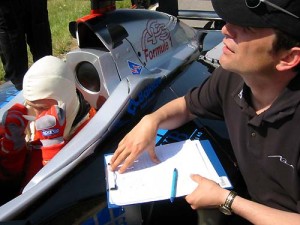 The formula 1 is an excellent example of performance, and not because of its high speed! It’s obvious to most that the quality of an activity depends, generally, on a series of parameters. The formula 1, however, more than any other professional activity in the world, shows even those who watch from the outside that the best performance is obtained by balancing these parameters, and not simply by maximizing them. That is, with Formula 1, it is understood that one maximizes a parameter to the detriment of others, and that the optimum is, etymologically, in the optimization (and not necessarily in the balance as certain bigots have always tried to instill in us).
The formula 1 is an excellent example of performance, and not because of its high speed! It’s obvious to most that the quality of an activity depends, generally, on a series of parameters. The formula 1, however, more than any other professional activity in the world, shows even those who watch from the outside that the best performance is obtained by balancing these parameters, and not simply by maximizing them. That is, with Formula 1, it is understood that one maximizes a parameter to the detriment of others, and that the optimum is, etymologically, in the optimization (and not necessarily in the balance as certain bigots have always tried to instill in us).
For example (these examples might seem out of date according to the changes implemented by Bernie Ecclestone each year, but I find them quite relevant for our needs!) What would you say if we started with more petrol in order to stop less for refueling? To make it last longer? Well it seems like a good idea, but let’s examine how that would influence the general performance. Well, the car would weigh more. There would be a higher consummation of the brakes, the tyres… and petrol. We could also increase the understeer…by how much? At what speed should we take on the curves of this track? Because of the larger weight of the car, the increase in inertia, and the increase of the time spent in the turn, if we use soft tyres, their consummation will be much higher. If it’s a circuit that’s hard on the brakes, well that could cause some problems too, especially if it’s a hot day. The vehicle will be slow to regain speed, and if the circuit is one for overtaking, then there’s another problem, because we will be easily overtaken and it will be difficult to do so ourselves. Speaking of overtaking, which opponents could one reasonably overtake today? Which tyres are we using? How much petrol? What is our absolute position, and our relative one, in the starting grid? But… with this strategy we save time anyway, right? Ok. How many seconds? and how many seconds do we lose? How much refueling time is gained, and how much tyre changeing time is lost? What is the net loss in seconds for a pass through the pit-lane? What do we expect will be the car’s position during the pit stop in respect to our direct opponents? Will there be more or less maneuvering space? So many connected questions, and all for the choice of one parameter: The initial amount of petrol! The engineers of a Formula 1 team work on tens of parameters and hundreds of scenarios at the same time, and must be ready to change them in real time if something unexpected happens on the track (the appearance of a direct competitor, safety cars, variation in the atmospheric conditions, mechanical problems etc). They know very well that taking the most powerful motor, installing it in the most rigid car frame, placing inside the best driver who will keep his foot firmly on the gas as much as possible might win a race, (which one?) but certainly not a championship! They also know that the car, the driver, the engineer and the mechanic can achieve nothing alone. To win a championship, one doesn’t need the best of everything. What is needed, is a complex system that works, and knowing to consider the various questions. To get back to the point, I find the F1 illuminating because it teaches us that it doesn’t make sense to implement a strategy simply because we like it, without having an idea of how it influences the complex system. For example, eliminating pasta and bread from the diet initially reduces the level of carbohydrates and makes us use more fats. If we want to lose weight, this would seem like a good idea. But how many other interactions are there? Is the pasta just a type of fuel and we a particular kind of vehicle? Or do those molecules actually carry out hundreds of different and connected actions within our bodies? And how do these functions modify themselves when we reduce the primary material that sustains them? And what do we replace the carbohydrates we’ve eliminated with? Are we actually eating less or substituting the carbohydrates with something else? If the latter is the case, what interactions does the substitute have with the complex system (us)? Naturally it’s unthinkable that each and every one of us becomes an expert in physiology, a personal trainer, a nutritionist, a biochemist, and a doctor at the same time. That is why we become victims of the market. Usually, we have to turn to someone who has assumed this knowledge for us. This person presents the final results of the analysis, and tells us, based on this knowledge, which rules and behaviours are appropriate to adopt each time. That’s where the problem begins, because this knowledge changes dramatically depending on how much and what particular knowledge this person has to start with. It depends on the model he or she uses for the interpretation of this knowledge. It depends on the purposes from which the disclosure of his or her knowledge arises, and fundamentally, on who has come to be the bearer of such knowledge, and how they came to possess it. Can I trust a yoghurt seller if he or she tells me that yoghurt is important for my health? What about a university that has carried out research paid by a yoghurt company? How many among doctors and nutritionists who advise yoghurt have actually been inside the human body to see how things really work? Or have these specialists simply read the same results summary of the research that the university has kindly distributed at the expense of the yoghurt company? Who should we believe? Who can we believe? [Translated from Italian by Hayley Egan]
Image courtesy of corsi-di-pilotaggio-formula-1.com


